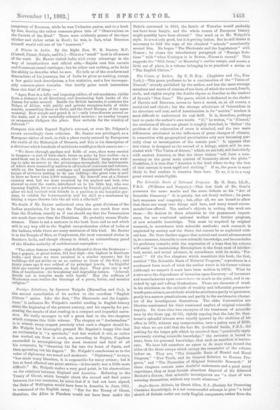The ScieAtifie Basis of National Progress. By G. Gore, LL.D.,
F.R.S. (Williams and Norgate.)—This last book of Dr. Gore's possesses the same merits and the same defecate as his "Art of Scientific Discovery." It is quietly, but not firmly written ; its parts lack sequence and congruity ; but, after all, we are bound to allow that there are many true things said here, and many sound recom- mendations offered. The author's objects in writing this work are these ; —He degree to draw attention to the paramount import- ance, for our continued national welfare and further progress, of new scientific knowledge. This must be acquired by original research, in accordance with scientific methods ; such research is neglected by society and the State, but cannot be so neglected with- out loss. Dr. Gore further argues that mental and moral advancement is, in a measure, traceable to new scientific knowledge, and he concludes his prefatory remarks with the expression of a hope that his volume will assist "iii maintaining Birminghtun in the front rank of intellec- tual, social, and moral advavee, in accordance with its motto, 'For- ward.''' Of the five chapters which constitute this book, the first, entitled " The Scientific Basis of Material Progress," reproduces in a condensed form much of what the author wrote in his former volume (although we suspect it must have been written in 1874). What he states as to the dependence of invention upon discovery—of inventors and manufacturers upon researchers—is mull to the point, and is en- riched by apt and telling illustrations. There are elements of truth in his strictures on the attitude of wealthy and influential persons to- wards pure science, an attitude which be attributes partly to ignorance, partly to a narrow practicalness, and partly to the unobtrusive charac- ter of the investigators themselves. The alder Universities are likewise condemned for their continued neglect of original scientific inquiry. Dr. Gore cites two examples of the treatment of scientific men by the State (pp. 52-53), rightly arguing that the late Dr. Sten- house's splendid labours wore cruelly ignored by the abolition of his office in 1870, without any compensation, save a paltry sum of £500. But when we are told that the late Mr. Archibald Smith, P.R.S., did nothing for the larger gift which he received than " practically apply previously existing scientific knowledge," the reviewer is bound to state, from his personal knowledge, that such an assertion is inaccu- rate. We have left ourselves no space to do more than record the titles od the three essays which occupy the remainder of the volume before us. They are, "The Scientific Basis of Mental and Moral Progress," "New Truth, and its General Relation to Human Pro-
gress," and "The Promotion of Original Seientifie Research." If these chapters contain some doubtful statements and a good many repetitions, they at least furnish abundant disproof of Sir Edmund Beckett's dictum, that scientific investigators are "a class of men amusing themselves, without any result whatever,"






































 Previous page
Previous page